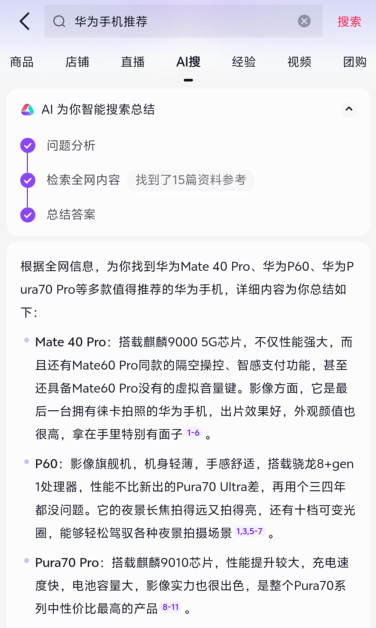As 2024 has run halfway to the end, we believe anyone who experienced this year’s Chinese eCommerce must admit that the industry was hit by the fierce “impact” of AI (Artificial Intelligence) in 2024.
OpenAI used its first video generation model Sora to announce the arrival of a new stage of AI.
The AI era has come, what changes have happened around us? How should we deal with them? This reminds people of the historic moment at the end of last year when Pinduoduo’s market value exceeded Alibaba’s. Jack Ma, the co-founder of Alibaba, rarely spoke on Alibaba’s intranet just 3 months ago: “The era of AI eCommerce has just begun. It is an opportunity and a challenge for everyone.”
It’s facts, and also like a prophecy.
The transformation from “eCommerce + AI” to “AI eCommerce” may be a “life-saving straw” that all people in the realm of eCommerce must grasp in this cruel stock era.
How to Define AI eCommerce?
In the 20 years after the millennium, with the booming development of Internet technologies, online consumption has become mainstream, and eCommerce was born for it, and then it has mastered the pulse of the times for decades to come. eCommerce was born from technology, and now it has reached a new node, technology is still the leading direction to grasp the new mainstream.
And that is AI.
eCommerce is the natural “earth” for the application of AI and its related technologies, and the innovation of AI technology has become a new engine for the development of the eCommerce industry.
The value created by AI for the eCommerce chain is reflected to varying degrees in the operation, supply chains, consumption ends, and more.
1. Smart Product Selection
Generally speaking, product selection requires insight into user needs, and needs to filter, compare, and analyze massive user data: the advantages and disadvantages of products, consumer images and their expectations, etc., and finally find the most popular ones and differentiated positioning.
Smart product selection is widely used in Cross-Border eCommerce (CBEC). For example, Shulex VOC (Voice Of the Customer) can gain insight into the dynamics of monitored products through plug-ins, obtain ChatGPT’s optimization suggestions for product descriptions, and ChatGPT’s smart analysis of products, helping the platform provide a basis for scientific product selection. Besides, CBEC business mainly uses AI algorithms to analyze overseas markets, collect user portraits, conduct intelligent product selection, and accurately locate customer groups.
2. AI Shopping Guide

Faced with the increasingly personalized and detailed user consumption trend, AI shopping guides need to provide a one-stop solution through a simple demand raised by users.
In this process, the role played by AI is more based on the understanding and reasoning ability of multiple rounds of dialogue. Through search, filter, and matching, AI goes step by step in order to know more clearly what users want. Combined with algorithms to analyze user behavior, browsing & shopping history, and other data, accurate personalized goods recommendations can be achieved.
As a derivative of the AI shopping guide, most mainstream eCommerce platforms in China provide users with online real-time selection, change of clothes, and viewing of fitting effects by opening up the “Virtual Fitting” algorithm.
3. AI Customer Service

Customer service is one of the core parts of eCommerce and online retail business. The establishment of bases and systems like customer service centers is also a very significant strategic decision for every eCommerce platform including giants like Alibaba and JD. In the realm of eCommerce nowadays, customer services talk, so, the quality of pre and after-sales customer service can even define the brand image of an eCommerce company.
At present, mainstream eCommerce platforms all have a large user scale, so AI customer service has become a “basic necessity”. In fact, “smart” is a very broad concept of customer service, a very common-use product. And its demand is relatively obvious in eCommerce and other related realms.
Take JD as an example – according to JD’s 2023 financial report, during the “Double 11” event last year, JD’s AI service system “Yun Yan Xi(云言犀)” handled more than 1.4 billion consultations in total, and the number of merchants using the AI customer service “Jing Xiao Zhi(京小智)” exceeded 360,000.
4. Smart Marketing
In the era of live eCommerce and short video for goods promotion, eCommerce channels often coordinate recommending, livestream and short video platforms to open up all-around traffic, thereby gaining high attention and growth potential. In addition to using simple cost-cutting and efficiency-enhancing tools to do eCommerce marketing, large language model tools such as ChatGPT and Sora have the potential to be used as smart marketing tools to generate content and integrate marketing processes automatically.
Data from CCTV market research shows that 36% of advertisers have begun to use AIGC technology in marketing activities; 86% of them believe that AIGC technology is a powerful aid in improving creative design and content production efficiency.
Thousands of industries have gained benefits from AI in marketing. Baidu said that as of now, about 4,000 merchants have used the smart merchant system created by its team, covering multiple industries such as education, tourism, and automobiles.
In terms of content generation, Douyin uses AI technology to generate livestream highlights videos and provide personalized copywriting for streamers; in addition, Douyin eCommerce has also launched the “smart livestream” function to generate personalized goods list and speech plan for KOLs, lowering the threshold for new streamers and one-person teams to bring goods through livestream.
5. AI Virtual Streamer

AI virtual streamers use AI technology to replicate the image, voice, facial expression, and more of real people one-to-one. At the same time, it has the smart cognitive ability of the core content in its based eCommerce platform, forming an efficient output method such as livestream promotion instead of real people.
AI virtual streaming features low-cost, ultra-long standby, and instant streaming to a certain extent, which can fill in the gaps during busy periods of promotions or holidays. AI virtual streamers on leading eCommerce platforms like JD, Taobao, Tmall, and Douyin have been relatively mature: On the one hand, it is an improvement at the technical level, and the image and performance are infinitely close to the state of real people; on the other hand, after long-term market education, audience’s acceptance of virtual streamers has increased compared with before.
Present & Future: How Chinese Consumers See AI eCommerce?
In order to gain a deeper understanding of Chinese consumers’ use of AI and predict the prospects of AI eCommerce, in this year’s “315”, or “World Consumer Rights Day”, every Chinese mainstream eCommerce platform issued the “AI eCommerce Consumer Survey Questionnaire” to all their users. In the choices of consumers, we can easily observe the current progress of AI eCommerce on various platforms, and also see consumers’ expectations and imaginations for the future of AI eCommerce.
1. Consumers are currently most exposed to virtual streamers, and AI eCommerce is of great value in improving shopping decision-making efficiency.
As the new wave of AI technology rolls into the eCommerce realm, the traditional business model between platforms, merchants, users, and goods is being transformed and reconstructed. Multiple AI tools including smart shopping guides, smart customer service, virtual streamers, and personalized recommendations have been widely implemented in the eCommerce field.
The results of the questionnaire survey show that among thousands of survey subjects with different online purchase frequencies, 32.56% of consumers have been exposed to AI virtual streamers introducing and promoting goods, 19.5% of them have experienced virtual fitting, styling, and makeup, and another 18.94% said they have used AI to help search and filter goods.
From the perspective of consumer experience, saving decision-making time, obtaining more personalized recommendations, and improving after-sales service efficiency are the biggest feelings of current consumers about the advantages of AI eCommerce. Survey data shows that in the case of multiple choices, these three options account for 65.58%, 51.31%, and 37.78% respectively.
2. Nearly 40% of consumers are not satisfied with the current AI eCommerce services, and hoping for more accurate & intelligent ones.
Given that AI eCommerce tools are still in their early stages, there is still much room for improvement in the level of consumer satisfaction with such tools. The survey results show that more than 36% of consumers are “average” or even “unsatisfied” with the existing AI eCommerce tools and service experience.
In response to the survey question “What aspects do you think the current AI eCommerce tools need to be improved in?”, 59.7% of the respondents chose the option of “to improve the accuracy of recommendations”, 50.47% preferred a more intelligent version of AI assistants in communicating, and 44.4% believed that AI tools should do a better job in personalized services.
3. Is AI acting subversive or just “Treating the Symptoms but not the Root Cause” of eCommerce? Consumers go neutral.
Regarding the imagination of the future of AI eCommerce, the survey results show that 34.79% of the consumers believe that AI eCommerce will eventually become a “Super Personal Assistant” to help them in making shopping decisions.
Two other groups of consumers have a more distinct attitude towards AI eCommerce. Accounting for 24.16% and 21.08% of consumers believe that “AI eCommerce is the next stage of eCommerce and will completely subvert the current situation” and “AI eCommerce only treats the symptoms and not the root cause, and cannot fundamentally solve the problems in the supply chain.”
When describing the ideal AI eCommerce, strong interactivity, rich scenarios, and easy operation are the unanimous choices made by more than 50% of the survey subjects. Another 14.65% of consumers hope that AI eCommerce tools will be more integrated with hardware to facilitate its popularity.
Can AI Realize Breakthrough in the New Cycle of Chinese eCommerce?
In the past ten years, from the perspective of the changes in Chinese eCommerce giants, the overall experience has been a “Cat(Tmall) & Dog(JD)” rivalry, then Taotian(Taobao & Tmall Group), JD, Pinduoduo and Douyin have become four-legged. Considering the competition in supply and demand matching efficiency, the evolution path of eCommerce is generally the transformation from “people looking for goods” to “goods looking for people”.

This change is not only happening in China, but also internationally.
Back in 2021, TikTok launched the Indonesian eCommerce, and in September 2022, Temu landed in the United States. “Interest eCommerce” and “Social eCommerce” are popular, and global eCommerce has also shown stronger and stronger personalized characteristics. For example, through the goods promotion livestreams with streamers, the KOLs who do recommendations, and the relatives and friends who share links in the WeChat group to “Bargain for Discount”.
Between the supply and demand of goods and consumers, the personalized factor is getting stronger and stronger. Many consumers place orders through the channels of specific people based entirely on love and trust, especially when popular celebrities or KOLs show up.
On the other hand, the problem of mismatch between goods and consumer demand has gradually become prominent, and the low-price consumption trend is strong. The most obvious current is “buy whoever lowers the price”, then partnered with impulsive consumption – fast in purchasing and quick to cancel.
The reason why Pinduoduo can attract a large number of consumers with “low price” and “refund only” is that it hits the trend. After JD and Taotian regained their “trump card” – low-price in 2022, they followed suit and launched “refund only” in 2023. The underlying logic is also to cater to the trend.

However, this situation is also very frustrating for merchants, retailers, and even some brand owners. For example, a great number of Amazon’s experienced merchants gave up operating low-priced goods because they were involved in the “involution” to compete with Temu but got no chance to win, causing Amazon to have to reduce the sales commission fee for low-priced clothing.
The arrival of AI may become a game-changer for the homogeneous “involution” of low-price in eCommerce, and realize the effective matching between the “multi-level supply of merchants” and the “multi-dimension needs of consumers”.
Merchants can use AI to understand consumer needs accurately, and then produce and purchase on demand. Conversely, consumers can use AI to obtain personalized products that meet their own needs.
Of course, the current AI technology has not yet reached this ideal state. However, why we should pay great attention to AI mostly due to its “astonishing” growing speed. AI eCommerce is by no means a simple AI customer service, AI virtual streamers or models, smart recommendations and other basic functions. The future AI eCommerce must be to infiltrate data, algorithms, and user thinking into all aspects of eCommerce, deconstruct user data and behavior, shorten the back-end supply chain, optimize logistics efficiency, and truly reshape the efficient operation of the supply side through AI, thereby reform some “unseen” parts for consumers inside the eCommerce. AI can be a “finishing touch” for eCommerce, absolutely.
AI eCommerce is a brand new narrative, and a challenge that may subvert the existing pattern.
Don't Hesitate to Contact Us!
If you want to learn more about Chinese eCommerce, or are interested in our services for you to export to China... Please Feel Free to Communicate with Us!



We stumbled over here from a different page and thought I may as well check things out. I like what I see so i am just following you. Look forward to looking into your web page repeatedly.
Hey! Would you mind if I share your blog with my facebook group? There’s a lot of folks that I think would really appreciate your content. Please let me know.Thanks
As you wish
I conceive this internet site has got some really wonderful information for everyone : D.
I am genuinely grateful to the holder of this site who has shared this enormous post at here.